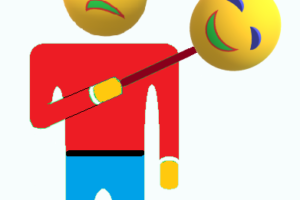Do you live your life attacking “the problem” or do you attack “the person”? More than likely, you will attack the person. Specifically, you will attack the person who is in front of you, either literally (perhaps a significant other or a boss) or figuratively (a political figure).
When you attack a person, you can put a face to your problem with communication. Yes, YOUR problem with communication.
There is a tremendous amount of energy, and frankly satisfaction, when you attack a person and get a response. It is pretty much guaranteed that if you call someone an idiot, bigot, elitist, Trumper, racist, fascist, snowflake, nutjob, leftist hack, communist, extremist or moron you will receive a response. And maybe that is what you are looking for.
Attacking a problem is like a child’s game of tug of war. Two opposing teams pulling from opposite directions. The goal is that at the end of the tug of war, a team has won. Hooray! Or is it that one team just overpowered another team?
Actually, there is a direct correlation between verbally attacking someone and that other person becoming even more entrenched in their opinion or belief. When someone is called a fascist or a snowflake, most people feel attacked. When they identify as being attacked, they feel defensive. And when someone feels defensive, they will either:
- React with aggression or
- Become more entrenched in their opinion or belief
Most importantly, someone who feels attacked stops listening.
Win-Win
There are only four resolutions to any conflict: Win-Win (I win, you win), Win-Lose (I win, you lose), Lose-Win (I lose, you win) or Lose-Lose (I lose, you lose). This conflict can be two people, two countries or two children on a playground.
Using the game of tug of war, let’s call one team “blue” and the other “red.” There is a line on the ground in the middle of the two teams. To win the game, one team has to drag the other team across the middle line.
Win-Win
If both teams are pulling very hard, and it doesn’t seem one will pull the other team across the middle line, both teams might agree to end the game. Because the end was by mutual agreement, both teams may feel satisfied with the outcome. Both the red and blue teams may even feel like they won!
Win-Lose / Lose-Win
When one team pulls the other team across the middle line, there is a winner and a loser. Let’s say it is the red team that wins; the red team pulls the blue team across the middle line. The red team feels happy, and the blue team feels sad or angry.
It may seem like “the war” is over when the red team drags the blue team across the center line. Oh no! It only means the battle was won. It does not mean the war was won!
The blue team will want to go back at it again with the hopes that next time they will be victorious. They agree to battle again. This time the blue team is victorious over the red team. The blue team is jubilant!
Instead of both teams being satisfied with their individual wins, what is the first thing that will be said by people on both teams? Of course, “Let’s go for best of three!” No one wins in these battles.
Lose-Lose
A fourth alternative is that the tug of war continues until the blue and the red teams have lost all of their team members due to exhaustion and/or injury. Neither team walks away from the tug of war with a resolution or even a mildly good feeling. Neither team is satisfied with the outcome. Both teams stick to their opinion that their team was the best.
Solutions to the Problem vs. Scapegoating
You may be familiar with the term scapegoating. If you haven’t heard of it, scapegoating is a defense mechanism used to protect someone (or a group of individuals) from emotional harm. This displacement of blame or responsibility scapegoats someone else into being responsible for failures or mistakes. It can relieve you of guilt and shame. It allows you to gain and maintain power and control over individuals or groups.
There are no winners when scapegoating is present. It is totally unhealthy for everyone involved.
Scapegoating implies there is a hero (you) and an identified villain (the person or group you are scapegoating). The villains may have done nothing wrong except exist. However, for you to be a hero, there must be a villain.
An individual or group who is scapegoated and has been identified as a villain may want to be a hero, too. In order to elevate their status to a hero, they may actually scapegoat another individual or group! As an example:
- Student “orange” identifies as a hero, so s/he scapegoats a villain, student “green”
- Student green wants to be a hero, too! Student green searches for a villain and scapegoats student yellow.
- Student yellow doesn’t want to be a villain! S/he wants to be a hero, too! Student yellow finds and scapegoats student purple.
And so the destructive cycle goes, ‘round and ‘round and ‘round. No one is a winner, not even student orange who started the process wanting to be a hero.
Are You Part of the Solution or Part of the Problem?
Attacking the person in a relationship is a common destructive behavior. Perhaps you have heard of the quote, “If you are not part of the solution, you are part of the problem”? Many find it much easier to focus on the blame game or another individual.
Attacking people happens when you place the blame on the shoulders of an individual or a group of people. That person or group carries the blame of whatever happened. Your instinct is to vilify them.
Why can it be easier to blame a person than to attack a problem? There are three primary reasons:
- people frequently have different perspectives on situations, resulting in misunderstandings
- strong personal, intimate emotions are usually involved, for example, jealousy or abandonment
- there is instant gratification when seeing a reaction from a person who is standing in front of you
Attacking a person may seem easier than attacking a problem, but done without skill, attacking a person may jeopardize any future relationship you have with that person. Keeping in mind that there are only four resolutions to any conflict, it will be important to remember to work only toward a win-win solution.
Common Ground
All too often, two people will focus on their differences versus what they have in common, their common ground. This is true if you have a difference of opinion with an individual (the person) or philosophically disagree with how a situation (the problem) is being handled.
When two people focus on the problem, the focus will always be on the resolution vs the conflict. If you find yourself in a situation that doesn’t feel like it can be resolved, step back. Then ask yourself:
- Are we both focusing on the same thing?
- Is our effort on finding a resolution or finding a scapegoat (villain)?
It will always be important to focus on attacking the problem and not the people.
Take Away Point
Problems can be solved, even when two people view a situation from very different perspectives. By focusing on the problem and not attacking the personalities of the people involved, a resolution can be obtained.
With warmest regards,
Thank you so much for reading this blog. If you enjoyed the content, please check out other blogs at:
RelationshipsRelearned.com
RVingNomads.com
https://www.amazon.com/author/kathryn_maietta_msw
https://relationshipsrelearned.com/my-self-help-books/
In addition to blogs and articles, I have written a series of self-help books called The Personal Empowerment Series and a fictional series named The Charlotte Novella Series. To view the books and novellas I have written, please go to my Amazon Authors Page.
To be notified of future posts, please enter your email address and click on the Subscribe button.
If you live in the State of Maine or Texas and seeking individual therapy, please go to my Concierge Therapy website: KathrynMaietta.com
| AI has not been used to create any content for my website, articles, blogs or books. All material is original unless otherwise noted. All photos and graphics within my website and blogs were taken or created by David Harrington or Kathryn Maietta. |











